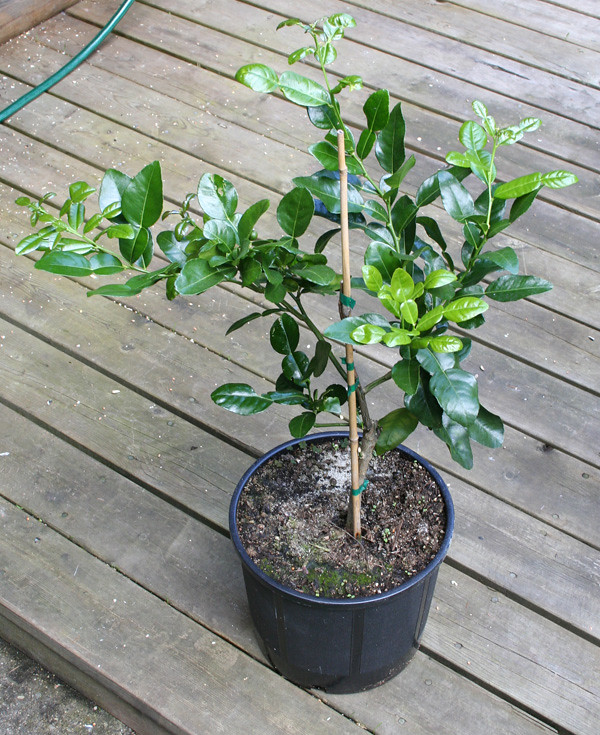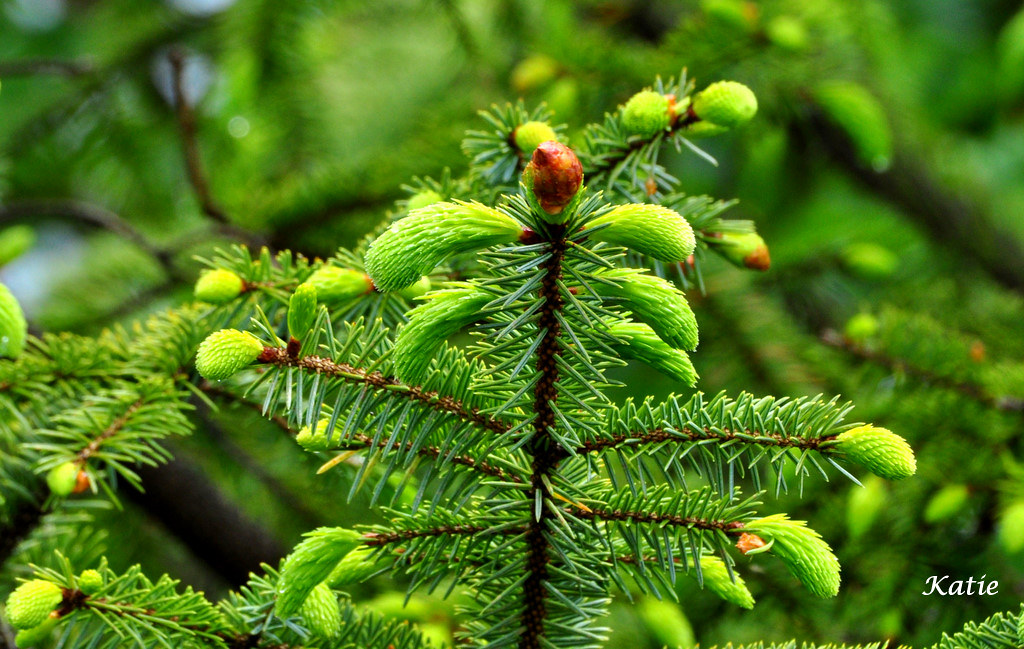How to Grow Lemon Tree Faster: Unlock Secret Tips!
A lemon tree can grow up to 2 to 3 feet per year under ideal conditions. Lemon trees grow faster in warmer regions with consistent moisture and nutrient-rich soil.
Lemon trees are typically grown for their fruits and are common in subtropical and tropical regions. They are evergreen and can grow up to 20 feet in height with a spread of 15 feet. The growth rate of a lemon tree depends on several factors such as the climate, soil type, water availability, and sunlight exposure.
A suitable climate, with warm temperatures and high humidity, is vital for the growth of a lemon tree. Additionally, the tree needs well-draining soil with a ph of 5. 5 to 6. 5 and good airflow around the foliage. Adequate sunlight of at least 6 hours per day is also crucial for lemon tree growth. With the right conditions, a lemon tree can grow up to 2-3 feet per year.

Credit: www.wikihow.com
Factors That Affect Lemon Tree Growth
Lemon trees are a popular choice among gardeners because of the fruit’s versatility and tangy flavor that adds zing to drinks and dishes. To ensure successful growth, several factors must be considered.
Climate And Weather Conditions That Favor Successful Lemon Tree Growth
Climate and weather play a vital role in the growth of a lemon tree. The following weather conditions favor the growth of a lemon tree:
- Lemon trees need a warm and humid climate with an average temperature of 70 degrees Fahrenheit for optimal growth.
- During winter, they need a cold temperature between 55-60 degrees Fahrenheit.
- They don’t thrive in dry weather or frosty conditions. Heavy rainfall and high humidity with moderate temperatures are ideal for their growth.
Soil Types That Support Lemon Tree Growth
The soil type in which you plant your lemon tree affects its growth and fruit quality. Here are some essential soil requirements for lemon trees:
- Lemon trees thrive in well-draining soils that are slightly acidic with a pH level of 6-7.
- Sandy loam soil and slightly clayey soil with good drainage encourage optimum growth.
- Good fertilizers containing organic materials such as compost should also be added to the soil.
How To Select And Plant The Best Lemon Tree Varieties
The type of lemon tree you select plays an essential role in the success and growth of your plant. Planting the right variety of lemon trees in appropriate weather and soil conditions will yield a healthier plant. Here are some points to consider when selecting and planting a lemon tree:
- Choose a variety of lemon trees that can thrive in your climate and weather conditions.
- Select a healthy tree with a good root system that will thrive in your soil type.
- When planting, ensure the soil placed around the roots is moist and well-draining.
- Lemon trees prefer sunlight, so it’s essential to plant them in areas with full sunlight exposure.
Nutritional Requirements For Optimum Growth
Just like any other plant, lemon trees need proper nutrition to grow healthily and produce quality fruit. Here are the vital nutrients required:
- Nitrogen is required for the plant to develop and maintain its foliage.
- Phosphorus for the growth of healthy roots, stems, flowers, and fruit.
- Potassium for fruit development and overall plant vigor.
Types Of Pests And Diseases That Can Stunt Lemon Tree Growth
Lemon trees are susceptible to pests and diseases, which can negatively affect their growth. Common pests and diseases that can affect lemon tree growth include:
- Citrus leafminer that damages young growth foliage leading to reduced photosynthesis
- Scale insects that feed on leaves and stems, weakening the plant
- Root rot and phytophthora can also stunt the growth of the lemon tree and damage the root system.
To wrap up, growing a lemon tree requires some planning, but the rewards are worth the effort. Understand the environmental and soil conditions, select the right variety, provide the necessary nutrients avoid pests and diseases, and enjoy a healthy and fruitful lemon tree.
Understanding Lemon Tree Growth Phases
Lemon Tree Growth Stages: Germination, Seedling, Juvenile, And Maturity
Lemon trees are popular garden plants because of their lush, aromatic foliage and juicy fruit. If you are growing your lemon tree from a seed or cuttings, it’s essential to understand the various growth stages of your plant. Here are the four primary growth stages of lemon trees.
Key Milestones In Each Growth Stage
Germination
Germination is the start of growing a new lemon plant from seed. Here are some key milestones of the germination phase:
- The seed will absorb water and nutrients from the soil to break out of its shell.
- The seed will sprout and slowly push above the soil.
- The seed will develop leaves to support photosynthesis.
Seedling
The seedling phase is crucial for the development of the plant’s roots. Here are some key milestones of the seedling phase:
- The leaves of the seedling will grow vigorously to support photosynthesis.
- The plant will develop a strong root system to support the growing plant.
- The seedlings will still be fragile and susceptible to stressors such as drought or pests.
Juvenile
The juvenile phase is when the lemon tree transitions into a larger and more robust plant. Here are some key milestones of the juvenile phase:
- The plant will continue to grow vigorously, and the trunk will thicken.
- The plant will produce more significant and more vibrant foliage.
- The plant will begin to bear fruit.
Maturity
The maturity phase is when the plant reaches optimal fruit-bearing age. Here are some key milestones of the maturity phase:
- The plant will reach its full size and height, typically at around 10-15 feet tall.
- The plant will produce abundant fruit throughout the year.
- The plant will require regular pruning to control its size.
Factors That Influence The Duration Of Each Growth Stage
Several factors influence the duration of each growth stage in your lemon tree. Here are some factors to consider when growing your lemon tree:
- Soil: The quality, pH level, and nutrients present in the soil can all affect how quickly your plant grows. Ensure that the soil is rich in nutrients and well-draining.
- Temperature: Lemon trees thrive in warm temperatures, preferring temperatures between 70-90°f. Colder temperatures and frost can slow down or damage the plant.
- Water: Your plant requires regular watering to survive and grow. Ensure that it gets enough water, but not too much, as too much water can cause root rot.
How To Promote Growth During Each Stage
To ensure your lemon tree reaches its maximum growth potential, you can implement specific measures during each growth phase. Here are some tips on how to promote growth at each stage:
Germination
- Keep the soil moist, but not waterlogged.
- Keep the plant in a warm and sunny location, and provide artificial light if necessary.
Seedling
- Keep the soil consistently moist, and adjust watering if necessary.
- Add a slow-release fertilizer to support growth.
Juvenile
- Prune the plant lightly to promote healthy growth and shape.
- Maintain regular watering and fertilization.
Maturity
- Prune the plant more thoroughly to control size and promote airflow.
- Provide consistent watering and fertilizer to support fruit production.
By understanding the growth phases of your lemon tree, you can take specific measures to ensure that it grows healthily and produces abundant fruit. With regular care and attention, your lemon tree can thrive for years to come.
Secret Tips For Fast Lemon Tree Growth
Lemon trees are a delightful addition to any garden or patio. Whether you are growing Meyer, eureka, or other types, these citrus beauties require some TLC to ensure they thrive. We’ll delve into the nitty-gritty of how fast lemon trees grow, and we’ll offer tips on promoting their growth and health.
Let’s get started with our subheading:
Promoting Root Growth And Development
A strong root system is crucial to the success of any plant, and lemon trees are no exception. Here are some tips to ensure your trees’ roots grow and develop as they should:
- When planting, make sure the soil is well-draining. Lemon trees don’t like wet feet. If your soil is heavy, consider amending it with sand or perlite.
- Use a root stimulant, a product rich in beneficial bacteria and fungi that help boost your tree’s root growth and development. You can find these products at your local nursery or garden center.
- Mulch around your tree’s base with organic materials like compost, grass clippings, or shredded leaves. This will help retain moisture around the roots and provide valuable nutrients.
Fertilization Techniques
Lemon trees need a regular supply of nutrients to grow and produce fruit. Here are some tips on fertilizing your tree:
- Apply an organic citrus-specific liquid fertilizer once a month during the growing season.
- Consider using slow-release fertilizers that release nutrients over an extended period.
- Don’t fertilize your tree during the winter months, when growth has slowed down.
Pruning Best Practices For Optimum Growth
Pruning is essential to maintain the shape and size of your tree and promote fruit production. Here are some tips on pruning your lemon tree:
- Prune your tree in late winter or early spring before new growth appears.
- Always use sharp, clean pruning shears to make clean cuts.
- Remove suckers and branches that grow below the graft union.
- Remove any dead, diseased, or damaged wood.
Watering Techniques And Irrigation Tips
Lemon trees require consistent watering, especially during the hot summer months. Here are some tips on watering and irrigation:
- Water your tree deeply once a week during the growing season.
- Check the soil moisture level regularly by sticking your finger two inches into the soil. If it feels dry, it’s time to water.
- Consider installing a drip irrigation system that delivers water directly to the roots and conserves water.
How To Choose And Use Growth Enhancers
Sometimes, even with proper care, lemon trees may struggle to grow. Here are some tips on choosing and using growth enhancers:
- Choose a growth enhancer that contains natural and organic ingredients, like kelp or fish emulsion.
- Apply the enhancer according to the manufacturer’s instructions.
- Monitor your tree’s growth regularly to ensure the enhancer is working.
With these tips on how to fast-track your lemon tree’s growth, you’ll be well on your way to bountiful fruit harvests. Remember to care for your tree year-round, and it will reward you with its delectable fruit, zesty fragrance, and vibrant greenery.
Troubleshooting Slow Lemon Tree Growth
How To Diagnose The Cause Of Slow Growth
Lemon trees are not normally fussy but may experience slow growth for various reasons. Diagnosing them and remedying the situation is crucial in ensuring a healthy tree that will yield sweet lemons. Here are some factors to consider when diagnosing slow growth:
- Soil: Examine the soil for quality and texture. Soil should be well-draining, with a neutral pH level of 7.0. Lemon trees thrive in soil that is rich in organic matter, and if the soil doesn’t meet these criteria, it may hinder their growth.
- Environment: Look at the surroundings where the tree is planted. Lemon trees grow best in full sun and in temperatures that range from 70-100 degrees Fahrenheit. If the tree is receiving insufficient sunlight or soil temperatures are poor, it may stunt its growth. Wind exposure can also cause harm to lemon trees, leading to defoliation or slow growth.
- Pests: Monitor these trees for any signs of pest infestation. Some insects like spider mites and aphids feed on lemon tree leaves, causing stunted growth and defoliation.
Strategies For Troubleshooting And Remedying Growth Problems
There are several strategies for remedying slow growth in lemon trees. Whether it’s a soil issue, pest infestation, or environmental factors, the following tips can help your tree grow more vigorously:
- Soil amendment: Add organic matter such as yard waste, compost, or peat humus to increase the fertility and texture of the soil. If the soil is deficient in nutrients, add a slow-release fertilizer to loosen the soil.
- Water management: Lemon trees require regular irrigation, especially before fruiting. Lack of water may cause slow growth in lemon trees or even drop the developing fruit. Water the tree frequently while avoiding overwatering.
- Pest management: Identify any pests attacking the tree and take necessary measures (for instance, insecticides or pesticides) to eradicate them, instead of waiting for the harm to progress.
- Pruning: Cut off any dead or diseased branches, and thin the plant if it’s too dense. Overly thick foliage may limit the amount of sunlight your tree gets, leading to slow growth.
Identifying Common Symptoms Of Slow Growth And How To Respond
Low growth rates are usually a sign that something is wrong in the environment, with a soil nutrient deficiency, or pest attacks. Signs to watch out for may include:
- Reduced foliage
- Small fruit size
- Slow regrowth after pruning
- Pests on the tree
- Falling leaves
In the case of slow growth, take immediate action. Applying soil and water management, pest control, and pruning helps address small issues before they cause more harm. By following these factors, you can enhance the health and vigor of your tree and eventually enjoy a thriving lemon harvest.
Frequently Asked Questions For How Fast Does Lemon Tree Grow
How Fast Does A Lemon Tree Grow?
Lemon trees grow fastest when they are young, and typically sees it grows around 24 inches or 60 cm annually. However, as a lemon tree matures and reaches 10 years, its growth gradually slows down.
What Factors Affect The Growth Of A Lemon Tree?
Various factors impact the growth of a lemon tree, including soil, water, temperature, and light. For instance, lemon trees thrive in well-draining soil with plenty of organic matter, and they need a lot of sunlight to blossom and set fruit.
How Long Does It Take For A Lemon Tree To Start Bearing Fruit?
It usually takes two to five years for a lemon tree to bear fruit. Factors like the age of the rootstock, soil fertility, and environmental conditions can affect how long the lemon tree takes to start bearing fruit. Furthermore, fertilizing your tree correctly, pruning at the right time, and keeping pests away will help ensure a healthy and fruitful harvest.
How Much Should I Water My Lemon Tree?
Lemon trees need a significant amount of water to grow healthily. However, it would be best to be cautious not to overwater them since they are vulnerable to root rot. As a general rule, water your lemon tree thoroughly but remember to avoid letting the soil get completely dry before watering it again.
Can I Grow A Lemon Tree Outside Of A Tropical Climate?
While lemon trees do better in tropical climates, they can still be grown in cooler regions as long as they are protected from extreme temperature fluctuations. You can grow potted lemon trees indoors, where they will receive sufficient sunlight and warmth.
Ensure that you are using a well-drained soil mix.
Conclusion
Considering all the information provided, it’s easy to see that lemon trees grow quite fast if given the right conditions. They can even grow up to several feet within a year! However, it’s important to note that factors such as age, location, soil quality, pruning, and weather can all affect the growth rate of a lemon tree.
If you’re planning on planting a lemon tree, make sure to choose a suitable location with plenty of sunlight and well-draining soil. Regular watering and fertilizing can also help your lemon tree grow faster. With proper care and maintenance, you can expect to enjoy fresh and juicy lemons from your tree for many years to come. Don’t forget to share your bountiful harvest with family and friends!
Related Articles:
10 Best Small Evergreen Trees with Non Invasive Roots
 Dr Ahsanur Rahman, PHD
Dr Ahsanur Rahman, PHDPine Tree Rescue: Saving Pine Trees with Brown Needles
 Dr Ahsanur Rahman, PHD
Dr Ahsanur Rahman, PHD






